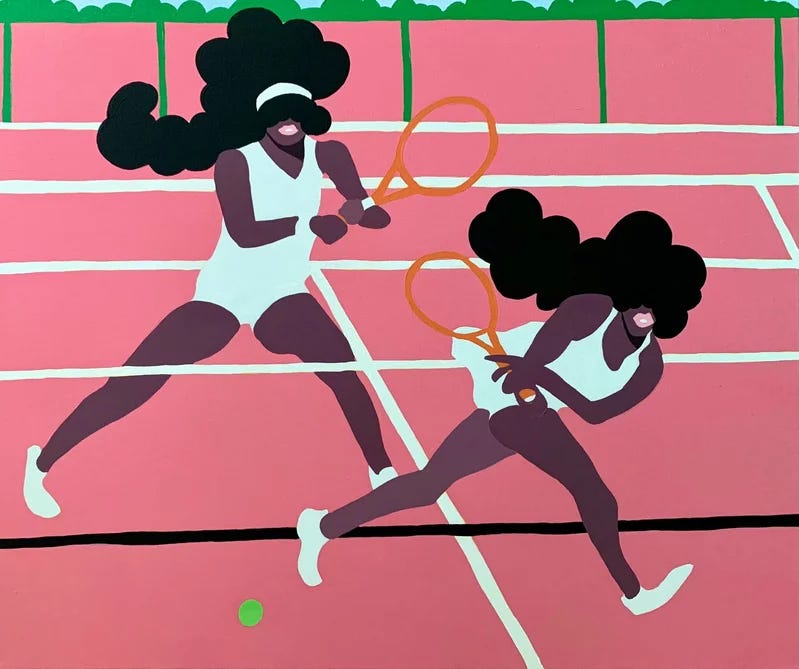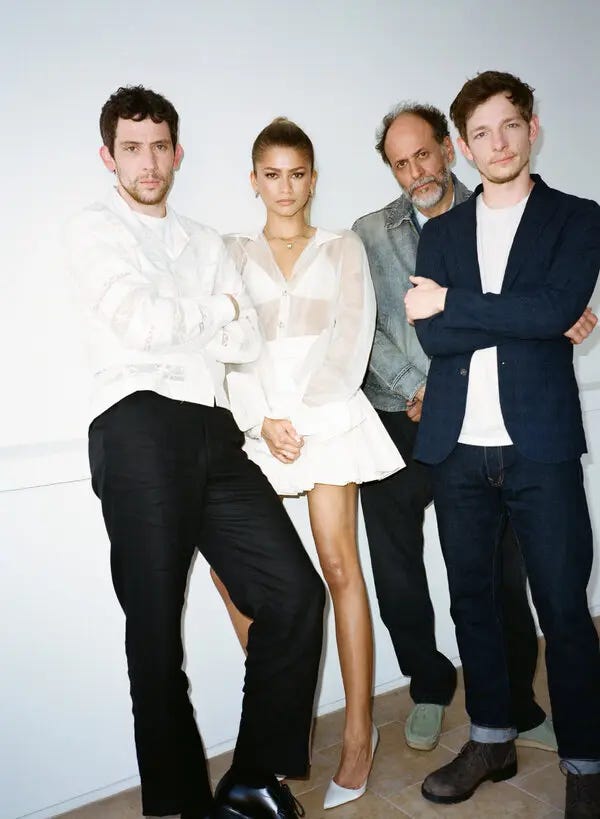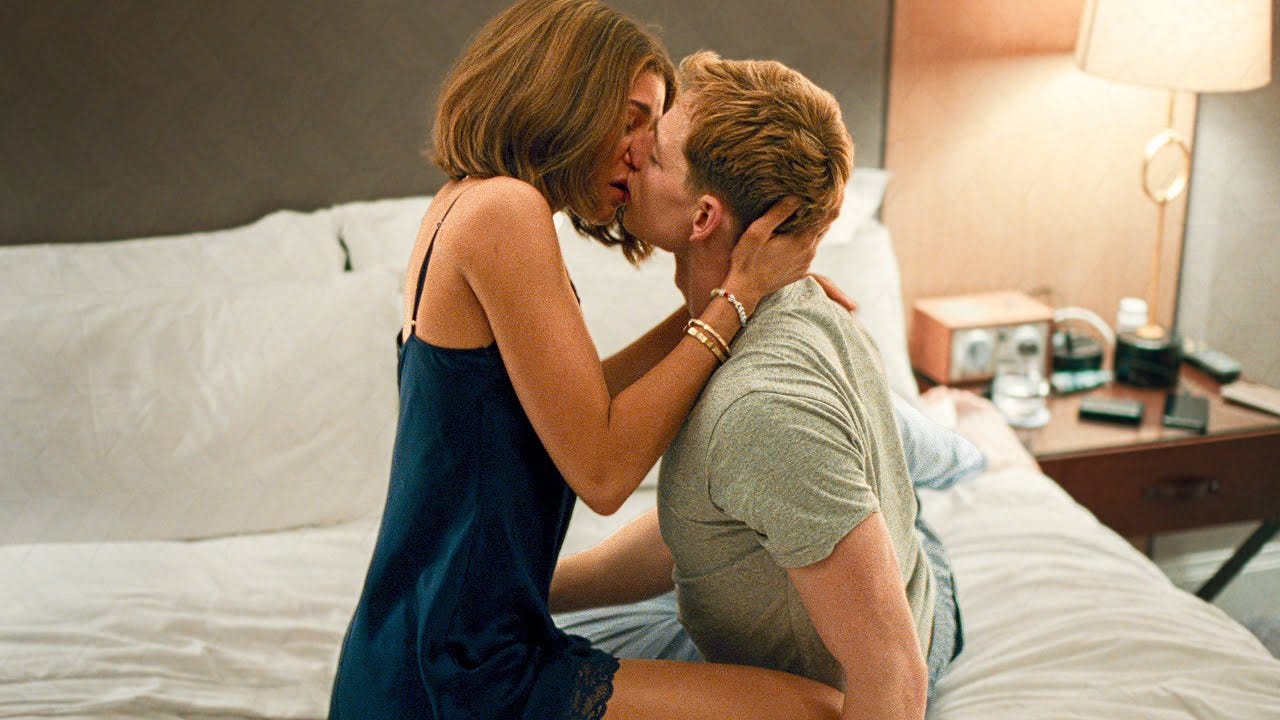Challengers (2024) Review
White Boys, White Lies, White Lines, White Paint, Tennis Whites & The Black Girl.

The closest I’ve personally been to being a tennis star was a few days during my freshman year of high school, fumbling through JV tryouts, where I was promptly cut for the more effortless serves, ponytails, and skirt swings of my boarding school’s cradle to the country club, talented since toddlers student-athletes. The private practice sessions in my neighbor’s backyard gave me the confidence of Coco Gauff when returning calculated backhands from an oscillating ball machine. Still, I didn’t stand a chance against any real challenger. To find my fitness, as a teen, I tried everything once, including a few white boys. Around this time, Lorde made her debut with Tennis Court. This anthem about doing what one wants adds to my memories of faking tennis pro for preppy photoshoots on IMG model camp courts or summer nights years later, skateboarding on the smooth concrete of my nana’s subdivision sanctuary. Last night, I went to the theater hoping to see Zendaya fulfill the tennis star fantasy of my dreams, but in Challengers (2024), the focus was on other kinds of fantasies, such as a who wants who forbidden romance.

“It’s not about where you come from […] it’s about winning the games that matter.”
This quote sums it up, but the trailer says it all, so don’t won’t worry about spoilers here. Set in the pro tennis tour universe, the subject matter of this film is a years-long love triangle between Tashi Duncan and the doubles duo ‘Fire & Ice.’ Though we follow the tumultuous career of tennis darling Duncan, the film is less a narrative about the fictional Venus and Serena heir and more so an interior investigation of playing the long game for love. This approach isn’t shocking, considering this movie is made by Call Me By Your Name (2017) director Luca Guadagino and shares a few similarities to that queer cult classic. Because Tashi ages from junior prodigy to boss bitch of a tennis power couple, this film shows the blurry boundaries of a career lifestyle, something I’ve been evaluating as I question dating in the art world and the polarity of personal and professional relationships. Tashi is the sultry ebony peak of a brunette (Patrick Zewing) and blonde (Art Donaldson) boy-based love triangle, which shows the sharp edges of iron sharpen iron relationships. How does one simultaneously operate as a friend, fan, coach, and confidant?
The power dynamics presented in Tashi and Art’s marriage carry the weight of ‘playing for the both of us’ after an injury ends Duncan’s pro athlete career before it begins. The ACL tear, I’m guessing, doesn’t stop Tashi from a successful career in her beloved sport. Not soon after, she finds serendipitous success as the heroic secret holder, queue Black savior-trope coach, for the white boy who has been fawning since the first time he saw her play. The mental and physical game are on display as Tashi navigates her recovery and learns the difference between letting lust lead and accepting the love she needs. Beyond being the most beautiful and desirable coach, Tashi is a teacher for the boys from the start, revealed a third way into this time-hopping film.
The tone is set early, quickly cutting through scenes of little dialogue but key actions that introduce us to the protagonist’s world and character traits with a dystopian disco game-time musical motif that often returns during tense battle scenes. But with so much time travel, it’s easy to get lost organizing events; Zendaya’s hair, from waist-length tresses to a shoulder-length semester to a grown and sexy bob, is the best barometer for a year. Other than hair, costume design is used to allude to character arcs and the evolving timeline, which is marked by an ‘I Told Ya’ slogan t-shirt that gets passed around as couples’ clothing. Refined sexy business chic elegance describes Tashi’s on-screen closet, where the accessories, bags, and jewelry had me drooling.
Flashing back thirteen years to their pre-college season, from afar, Patrick and Art study Tashi’s game from the court to endorsement contracts and try their best to run their boyish game on her. Her nerve-free, nice girl energy exudes the confidence of effortless control in all instances, including when she arrives back to the boy’s hotel room wearing a hot pink velour Juicy Couture jacket and running shorts. From analyzing each suitor’s natural abilities and seducing them out of their childhood secrets, Tashi shows who is in control, leaving Art and Patrick competing for her phone number. This wager raises the stakes for the US Open Junior Finals, which the could-be brothers had little concern for before Duncan sent them into battle. Tashi’s winner-takes-all orders create new ops, resulting in a rivalry that ruins the white boys’ friendship. The battle of white boys reveals the forbidden romance at play as Tashi hops between the men at her whim. The movie's long timeline reflects the nuanced and changing dynamics between platonic, romantic, casual, and lifelong friendships- a blurriness of love that endures and evolves to border selective bi-sexuality for one’s best friend. Guadagino established this extended look at a fateful romance in Call Me By Your Name, here trading the taboo age gap for an interracial insurrection.
“I’m taking such good care of my little white boys” at once reiterates the racial dynamics, mammy alluding, MILF, but “not your mommy,” just the savior his career needs Jezebel role Zendaya takes on for this film that I can’t help but feel is chiefly written for the white gaze. Though we see her age into a mother, the biracial daughter of Art and Tashi stays nearly mute, a child prop ironically named Lily (white). Second-place gaze privileges anyone who fancies Z, which should be everybody. After Rue and “Euphoria,” it’s easy to fall in love with this sophisticated, polished, put-together but doesn’t need a bra, rich bitch, who knows what she wants character for the talented and certainly maturing actress Zendaya. My harsh, some may call hater, reading means no offense to the biracial beauty nor her real-life romance with leading white man Tom Holland. Even he and the white boys of this movie, Mike Fist and Josh O’Conner, radiate different breeds but similar lap dog, go fetch, good boy energy. And good dogs they are; Tashi got a rock of a ring, a racket, and dick swing of a husband out of Art. Yet I would gag if my man crawled in my lap, feeling like a cowardly crybaby.
Keep reading with a 7-day free trial
Subscribe to The Joi of Art to keep reading this post and get 7 days of free access to the full post archives.





